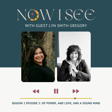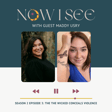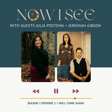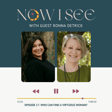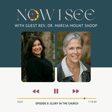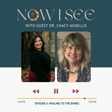Introduction to 'Now I See' Podcast
00:00:01
Speaker
I was lost in utter darkness I was trapped in toxic shame I was bound by my religion Till I chose to break away
00:00:24
Speaker
Now I'm finding my true colors For the first time I feel free Now I'm learning self compassion And as I heal I'm finding peace
00:00:51
Speaker
Welcome to Now I See, eye-opening stories from the formerly faithful.
Amber's Journey of Self-Compassion
00:00:56
Speaker
I'm your host, Amber White, and here, me and my guests share our experiences in loving and leaving rigid faith systems. Together, we shine a light on the dark corners of these institutions and share the joys of rebuilding life on our own terms. I promise you'll leave inspired, even if you are a little teary-eyed.
Meet Emily Richardson: Religious Trauma Specialist
00:01:24
Speaker
Hi, and welcome back to Now I See. I'm your host, Amber White, and I am talking with another therapist today, just in time for the holidays. Today I'm talking with Emily Richardson of Sparrow Soul Work here in South Carolina. Emily practices radically open DBT and specializes in therapy for folks working through religious trauma, deconstruction, and over control.
00:01:53
Speaker
It's pretty amazing stuff. Admittedly, I am personally very drawn to her work because of my own struggles with over-control and perfectionism. You'll hear a few examples of that later in this episode. It's hard to say where exactly the over-control and perfectionism started. Was it nature or nurture? The more I've examined this in my life, the more I think it's both.
00:02:23
Speaker
I think I had a predisposition for struggling with these things that was reinforced by the nature they received in the church and at home.
Religious Upbringing and Perfectionism
00:02:32
Speaker
I was raised on the idea that whatever I did needed to be good enough that if Jesus were to come and see it, he'd be proud of the work I did and not ashamed of my efforts.
00:02:45
Speaker
I was brought up in a theology that would use the word grace, but clung to legalism for dear life. They loved the verse, faith without works is dead. It's a great one if you want to guilt and mobilize a congregation into succumbing to specific ideas about how a person should behave.
00:03:04
Speaker
These teachings stick with a lot of us who decide to leave our faith. When you've internalized that your performance equates to the level of approval and love you'll get from your community, it's hard to understand and accept that love and acceptance don't really work that way.
00:03:23
Speaker
I have spent ungodly, no pun intended, time and effort on being excellent throughout my life. And I've spent years poring over and mourning the times that I wasn't. I lost a job that was absolutely not the right job for me nearly 10 years ago that I still have nightmares about.
00:03:47
Speaker
I have worked my ass off in every romantic relationship. I have worked my ass off in every job. I have worked my ass off to make strained familial relationships work. It hasn't been particularly healthy on my part. And I gotta tell ya, not one time has my over-control or perfectionism really paid off.
00:04:11
Speaker
Sure, I get recognized for it on occasion, but overall, it's done more to keep me stuck than move me forward. All the striving, all the late nights, all the stress, it wasn't really worth it. I've been doing a lot of healing work on these aspects of myself over the last two years, and I am regularly blown away by how different my life looks now than it did two years ago.
00:04:39
Speaker
It feels really good, and I've been able to widen my window of tolerance for things taking time.
Personal Growth and Life Milestones
00:04:47
Speaker
Right now, my fridge needs to be reorganized and cleaned, but I've been working on this podcast all day, so I'll likely do it tomorrow, or sometime next week, and read tonight instead.
00:04:59
Speaker
This is new for me. I am pacing myself at home, at work, and most recently on getting married. Surprise! My husband Justin and I eloped on November 19th in a lovely, simple ceremony. It was just us, an officiant, and a photographer.
00:05:26
Speaker
I'll put some photos up on Instagram for y'all to see, but it was a huge deal for me to keep this simple and not try to make it perfect.
00:05:37
Speaker
And I have to say, it felt so good to prioritize the day being easy, fun, and low stress over it being aesthetically perfect and under control. I checked my perfection at the door, and you know what? So many things turned out better because of it.
00:05:59
Speaker
Anyone who's left high-control religion can tell you what a big deal it is to let go of something that has traditionally made such a fuss over.
00:06:11
Speaker
It felt like a major step forward in living my life the way I really want to on my own terms and with only my and Justin's opinions in mind. Two years ago, I wouldn't have done that. So here's to healing and growth that makes life so much sweeter, easier and better.
00:06:35
Speaker
I am sending all of my best wishes for your own healing this holiday season, whatever that might look like. Alright, let's get into this fun and insightful conversation with Emilia.
00:07:03
Speaker
Hi, Emily. It's so great to see you today and have you on the back. People are like, see you. Yes, I get to see her. Unfortunately, you do not. But I'm very glad to have you here today and share your story and share your experience with my guests, because I think you have this incredible insight into what it can be like to come out of these situations and try to work through the aftermath of the
00:07:32
Speaker
things in our own minds that get us tripped up.
Emily's Religious and Educational Background
00:07:34
Speaker
So I'm excited and thank you for sharing with us today. Oh my gosh, thank you so much for having me. I'm so pumped to do this. So let's start out by having you share your background a little bit. What faith were you involved in? What was that like for you? And kind of what led you to start questioning it? You know, just the light, simple things. Yeah, yeah.
00:07:58
Speaker
And I'm like, how do I make this answer not a thousand years long? I grew up very Christian and obviously that's a spectrum. So I spent my like formative like birth to fifth grade in Southern Baptist.
00:08:16
Speaker
Not fundamentalist Southern Baptists, just like good old Robert rules of order Southern Baptists. I know. Like back when we just, I think our church just started to have a contemporary service when I was like in fourth grade where you could wear jeans and they would play Chris Tomlin. You know, it wasn't just like, it was, we were radical.
00:08:40
Speaker
And then there was like a church schism as there is want to be in the Southern Baptist Church. And so from there, like my family went to a lot of different non-denominational evangelical churches.
00:08:55
Speaker
We helped start a couple of plants that ended up failing and then ended up in a multi-site megachurch essentially. My church that I attended from 8th grade through college was not a megachurch. It was maybe 100 people-ish.
00:09:18
Speaker
and it met inside of an elementary school, you know? But the entire, because it was multi-site, like we were the Greenville campus and so like the mothership was in Charleston and had like dozens of other campuses. So we have a like very mega church vibe with like a very like home church vibe. So I think when I first started like having questions was probably in high school. I went to an arts high school in the upstate
00:09:48
Speaker
And I was meeting people outside of my faith community. I was making very good friends for the first time with girls who read Cosmopolitan with boys who were flamboyantly gay. And I was like, I really like you people, but also you're of Satan. So what do I do with that? I don't know. Complicated. Very, very, very complicated.
00:10:14
Speaker
And through a lot of those challenges, I did, I think, what any very devout good girl does. I decided to go to a Christian college to be able to ask all of my questions without being, quote unquote, led astray. That was quite literally what I wanted. So I ended up going to Wheaton College in Illinois, the Harvard of Christian schools. Yes.
00:10:43
Speaker
And I had a very good experience there because I was always going to have a good experience there. I was talking to someone recently about the thing Wheaton really wanted, the culture at Wheaton was, we're going to go change the world and you're going to go find your husband. And I was like, that sounds awesome. I would love to go do both of those things.
00:11:07
Speaker
That's the perfect good Christian girl. Genuinely. I was
Transitioning Faith: Evangelical to Episcopalian
00:11:12
Speaker
a white straight girl. I was never going to have a bad time at Wheaton. Ask other people who don't have those qualities and you will get a different story. Yeah. But it was when I left Wheaton, I decided I wanted to be a missionary. I wanted to go work with refugees. And I worked very hard to do fundraising.
00:11:36
Speaker
And I did not come together. And I was sitting with a fundraising coach and they were like, Emily, you're 21. All of your friends are 21. They have no money. Like, this is not gonna probably happen for you. And I was heartbroken. I was like, I have done everything right this whole time. I have dotted all of the I's and crossed all of the T's and I've worked so hard and I followed the rubric.
00:12:01
Speaker
And now you're just telling me I'm gonna be a receptionist at the law firm and that's it? I always felt like the trajectory of my life was up and up and up and up and up. And so the idea of up and up and up and then I just felt like I got pushed off a cliff.
00:12:19
Speaker
And I remember sitting in a women's Bible study. We were reading through the book of Mark, I think. And there's a part where Jesus says, like, ask in my name and it shall be given to you. And I was like, bullshit, dude. I've asked for everything.
00:12:39
Speaker
in your name. I wanted this career. I wanted to go live abroad. I wanted to have like a soulmate and I asked it in your name and I'm sitting here single living in my childhood bedroom as a receptionist at a law firm with absolutely no plan. Like I've got nothing. Like what, what did I go do all of this for? Um, so that was my first big deconstruction and
00:13:07
Speaker
That was when I first like really, I think fully deconstructed from evangelical life.
Therapist Journey and Eating Disorder Recovery
00:13:12
Speaker
Like I ended up, like I stopped going to my family's Nondinam church and ended up joining an Episcopalian church and that felt really lovely. And that was a really nice landing spot for me for a while. I feel like, you know the like,
00:13:34
Speaker
You could take the girl out of fundamentalism, but it's really hard to take fundamentalism out of the girl. Yes, ma'am. I have a million. It's like, oh, I just kind of like jumped from different, and I kept making things rigid, rubrics, rigid rules, every place I would go. So the Episcopalian church, I was like, great. Everyone in leadership here isn't all related to each other.
00:13:58
Speaker
There is some like oversight here. There is a cult of personality. We have a like corporal corporate confession, which I found very soothing of like, we are all gonna show up and say out loud that we don't have our shit together, as opposed to non-denial life where you like walk in and you're like, I'm great. And God is good and all the time he is good and the end.
00:14:26
Speaker
Then from there, there's a whole little period. It's a whole other story of how I decided to become a therapist, but ended up becoming a therapist. Look at you.
00:14:40
Speaker
So I went, I got my master's degree in marriage and family therapy from Congress. I was working with my associate's license inside of a school with traumatized children at a Title I school. And I realized that my eating disorder that I thought I had healed in college through the grace of Jesus had just come raging right back.
00:15:05
Speaker
So there might be a deeper issue that you have trusted. Jesus is what I'm hearing. Maybe. It was what I wanted to do, recovery for the second time with like a proper eating disorder specialist therapist. And I was like, we didn't do any of this stuff. We're doing the first time. Whoops. I know. And I can't fault my first therapist too much, honestly, because I was a really good liar. I was so good at like walking in and doing the like,
00:15:35
Speaker
I was struggling yesterday, but I feel better about it now. And she was like, well, then I have nothing to do with this. Like, I can't help it. If you've already theorized yourself, then like, what am I going to do with that? So it was in when I like properly entered ed recovery.
00:15:52
Speaker
And I was doing all of the like, journaling work and therapy work and realizing that a significant amount of my Enid is sort of language is religious language. And then I started having like, anxiety attacks when we would drive up to the parking lot at the church and I was like, I can't get out of the car.
00:16:14
Speaker
I can't go listen to scripture being read out loud. Even though that was something I found very comforting, like a year before that, I was just like, uh-uh, this is all the same in my brain. Wow. And I can't do it.
00:16:32
Speaker
I haven't really been, I haven't attended a church really since TBH, which feels really bananas. But I just, yeah, I was like, I have to take a full step back. And in that has been, it's been really helpful. My like, ED recovery went way smoother after that. That's so interesting.
00:16:55
Speaker
Do you feel like maybe you offset or moved the religious trauma recovery or the religious trauma into
00:17:04
Speaker
beating world to get off Senate. Yeah. Yeah. Which I didn't like, I have always like told my therapist, like, dude, we're going to have to get to some of this, like, what do I do with God and Jesus stuff? Because it's been literally my whole life. Like I went to a college whose mission statement is for Christ and his kingdom. And I was like, yes. So I'm going to have to figure out what my life purpose is if it's not this. Right.
00:17:32
Speaker
but let's figure out how to like get out of bed, figure out how to eat breakfast. Like I just didn't, yeah, for anyone who's been through like eating disorder recovery, it does feel like you kind of move back into being a child a little bit of like, how do I do this? Yeah, relearning. Re-learning really basic skills of how to take care of oneself. Mm-hmm.
00:17:59
Speaker
I think by being able to honor my body, being able to honor my intuition really helped expedite a lot of that religious unlearning and relearning as well. Yeah, that's beautiful.
00:18:16
Speaker
I was thinking as you were talking about sitting in the church parking lot and not being able to go in, do you remember enough to be able to describe what that felt like in your body? Because something I think a lot of us who are deconstructing our learning is to reconnect mind, body, spirit, and listen to our bodies because they sometimes tell us first.
00:18:39
Speaker
yes yeah it was a lot of physical tension it was a lot of physical tension especially like in my abdomen it felt like my stomach like clamped up and sank a little bit and i can just remember like how like tight my shoulders were how like close my arms were to my body which now i
00:19:01
Speaker
I'm able to look back now and be like, oh yeah, I was very, I very much felt under threat. Like my body was reacting from its sympathetic nervous system. Like I was being threatened. At the time I didn't think that at the time I was like, why am I being so weird? And my husband like put the car in park and I was just like, I can't, I can't. And he was like, what do you mean? And they looked at me and I think he just saw that like my face, my facial expression had kind of gone flat.
00:19:32
Speaker
He saw my body language and he was like, so we're not going inside? And I was like, I don't think I can do that. And he was like, that's totally fine. Like, that's totally fine. Let's just go to the Starbucks. Let's get you a coffee. We'll just drive around. We were living, just as a side note, we were living in my parents' basement at the time. My parents were still very devout. So we had to like kill the hour.
00:19:57
Speaker
So you made your own church. Starbucks in the car church. Starbucks in the car church. And then I think we ended up doing that exact thing maybe one other time where I was like, that's not going to happen again. This is going to be fun. And then again, we like parked and I was like, and he and Kyle just turned to me and looked at me and he was like, are we going in? And I went, nope, because it just, yeah, my whole body like flamped.
00:20:28
Speaker
up, it clamped like up into itself. And I was like, no, there was just no reason to force myself to go do it. I think if we were meeting somebody, I would have been like, okay, fine. I would just like suppressed that. Um, like I just would have moved, you know what I mean? I would have like pushed through it. It wasn't like a debilitating sense of dissociation, but because it was like, this is my own free will.
Faith Community Challenges and Mental Health
00:20:57
Speaker
Yeah. I'm glad you had somebody who was supportive and willing to see you for where you were at and not try to not make you feel worse, right? No. Kyle is the best. Why do you think so weird? I know. I remember asking him on our very first date. I was like, because we were introduced by a mutual friend who was an atheist. And so we both thought we were atheists. And that made us both very anxious. And I was like, are you, like, how do you feel about Jesus?
00:21:27
Speaker
I know, like what a bananasville sentence. And what he told me at that time was I'm not a strong Christian man. Like I do believe in God. I like meeting with him in nature. My grandfather's a Baptist preacher. Like I'm very familiar with lots of like Christian stuff, but when it comes to like my actual faith, it's I'm not a strong Christian man. So that's a deal breaker, I understand.
00:21:52
Speaker
And I was like, I don't think it's a deal breaker. And to this day, I'm always like, praise heaven. I'm so glad you are a strong Christian man because it allowed him to do things like look at me and go, okay, we don't have to go inside it. Isn't it interesting how it's, for those of us who have left the church and are deconstructing, like we find that radical acceptance for the first time sometimes outside of the church.
00:22:22
Speaker
Yeah, I think it's the thing I've been able to maybe put into words better over time is how bad faith communities are at dealing with uncertainty. And so doubt, deconstruction, pain, tragedy, loss, failure, very, very bad. Yeah.
00:22:47
Speaker
at just allowing the uncertainty to be uncertain and being able to go like, okay, this doesn't have to be anything, it's not, let's just, what's the right, what do we need to do in the next 10 minutes? Faith communities are very bad at that, very, very bad at that.
00:23:04
Speaker
Yeah, they have to be like, well, think about heaven. You know, you'll be there one day and now all your earthly problems have no meaning and no value. Totally. This is all for some like greater purpose. This is just one thread in the greater tapestry of your life and you don't understand it yet. And it's like, of course you don't fucking understand it. And how does that help me now? Like sometimes it's helpful to gesture beyond
00:23:32
Speaker
the minutiae of the present moment, but for the most part, like people, if you're in a moment of suffering, it's going to grip all of your attention. And so being able to say like, you shouldn't be paying attention to that is basically like telling someone like, don't think about oranges, just don't think about them, about how they're orange, if round, and how they smell nice when you open them, just don't think about it. I'm currently thinking about strawberries since you said that. It worked. You have superior spiritual abilities.
00:24:03
Speaker
Oh my goodness. You know, I mean, this conversation we're having right now is reminding me of the way that I learned about mental health in the church. Oh yeah. And I'll be curious to hear if you had similar experiences. Oh man. Yeah. So very anti-medication of any kind. Right. There's a huge stigma. It's social because I'm in this deep South church. Yeah. Yeah. Yeah. But it's also part of the, part of the dogma, part of their belief system is that
00:24:33
Speaker
you do not need medication ever for any reason to help you with a mental problem. Your problem is a faith problem. And so things like, you know, taking something for anxiety or depression or, you know, most recently, and this, this still infuriates me. So I'm going to talk about it very openly. Oh, I'm so excited. Even though it,
00:24:58
Speaker
I don't know. I'm not trying to start arguments with my family, but I'm very furious about this. There is a young girl in my family who struggles with, she's hearing voices. She's having auditory hallucinations. Yeah. If you look past the spiritual, if you look past that,
00:25:20
Speaker
and into well-studied research on this, there are reasons this happened. She's had a very traumatic life, a very difficult time, and she could use some therapy, probably some psychiatry to help process. Maybe some medication, because there's something happening here. Right, just to help improve daily functioning in the meantime, yes. Right, well, and to give her some peace.
00:25:47
Speaker
She's a child. She's very young. She's not even a teenager yet. This is a very young, you know, she's had a very hard life and the family is very much convinced that it is a demon talking to her. And it makes me want to cry just like thinking about it right now. Cause this, this idea that there can't be
00:26:10
Speaker
scientifically-based factual here on earth in this moment, as we were just talking about, in this moment issues that can be dealt with in this moment. It has to be a demon from hell haunting this girl, which then offsets the fact that her parents have treated her horribly from the time she was born, from before she was born. Accountability, right. Right, and then we're offsetting this onto some spiritual warfare, and now this little girl doesn't get help.
00:26:39
Speaker
And so I think about the way that I learned about mental health and the way I learned about the spiritual world. It was mental health. Your problem is spiritual, not mental, not physical. Oh my gosh. It's devastating. Totally. And for her, and for me and for so many, it's putting yourself at war with yourself.
00:27:08
Speaker
And so often what I'm saying to clients is I'm like, it makes a lot of sense why your brain did that. Like I understand it's not very helpful, I understand it's not comfortable, and I understand it's not where you want to be, which is why you are sitting with me, and we're gonna hopefully move you to a new place. But your brain, like your body's not stupid. Your brain's not stupid.
00:27:34
Speaker
and so it is trying in all moments to keep you well and keep you healthy and sometimes it takes some pretty extreme ways to do that that again aren't comfortable and maybe don't help you right now but like
00:27:51
Speaker
They're trying to tell you something. Right, to be able to, if we're able to make friends with that part of yourself instead of feeling it as demonic and something that needs to be, that is entirely evil and needs to be banished. Right.
00:28:13
Speaker
those aren't necessarily guarantees mental health professionals can make. I can't just feel like 100%, all of your anxiety, poof, gone. That's not- You're not a miracle worker, it turns out. No, no.
00:28:29
Speaker
sometimes I use tarot cards in my session as a form of like to help someone focus externally to help an emotion stop from being so overwhelming and pressing in their body and being able to go like let's focus on an image. And the thing I always say is I'm not a witch. I'm not a witch. I don't have a crystal ball so often my like my clients who are just really wonderful rule followers will turn to me and be like what do I do?
Therapy Misconceptions and Stigma
00:28:59
Speaker
And I'm like, I don't have a crystal ball, babe. Like, I don't know. Also, on your life, you would know better than I would. I'm just here to help you with the process of it, not the content release of it. But back to your question about how I learned about mental health in evangelical world, the short answer is we didn't fucking talk about it.
00:29:27
Speaker
It just wasn't spoken of. I'm sure there was a strong stance on medicine. It was never ever talked about. And it's so funny to me, and maybe it wasn't, I filtered it out because I have a sibling with a very severe mental illness and they needed to be hospitalized multiple times and they needed to be on medication. I don't know how long they've been on medication, but I'm gonna guess probably since early high school.
00:29:57
Speaker
And so it was always very clear to me. It's like a genetic illness. Like I have like uncles and aunts with this thing. Like I just, so I was just like, yeah.
00:30:07
Speaker
We need medicine. Medicine is needed. So that was never a thing. But when it came to my raging perfectionism and anxiety, the mild obsessive compulsive stuff that would happen, that was when it would be like, just cast your cares on him.
00:30:31
Speaker
Um, think of, think like there's a reason my, um, practice is called sparrow therapy because it's the like, think of the sparrows. And it's like, that's not sufficient. It's a nice idea. And I am okay with that being an idea. Yeah. But just going like, Oh, I need to be.
00:30:56
Speaker
This is an internal problem. And if I just had more faith, if I was just stronger, if I had more discipline, if I had more integrity, then these worries would not be eating away at me. So I never saw anxiety or depression as like demonic forces. I think again, like my family situation just made it very clear that like, mental health is a very real thing. Mental illness is a very real thing.
00:31:25
Speaker
But when it came to if you weren't like straight up in manic episodes, anything below like, you know, caught an ambulance was like, you could just be better. Come on. Yeah. Interesting. So we had a very different experience of that, but it sounds like
00:31:45
Speaker
church-wise, it was just unaddressed a lot. Yeah, that was the word. Interesting. And now you're a therapist. Ta-da! Amazing how that happens. Oh my gosh. I was talking to, okay, so my husband was talking to a co-worker yesterday and he told me, I didn't know this, but it makes sense, that when he tells people, they'll be like, what does your wife do? And he tells people he's a therapist. Most often the thing he gets
00:32:14
Speaker
is, oh man, I bet you can't get away with anything.
00:32:19
Speaker
And I look at Kyle, and I'm like, that is so not our marriage. And he's like, I know, they don't understand. And he's like, the thing I want to say, but I never do, because I don't want to insult you. I'm like, okay. And he's like, you guys must not understand that therapists are really broken people. Yeah, that's true. I was like, you should say this to people, to be like, therapists come from deeply broken places, that's why they want to heal everyone else's.
00:32:47
Speaker
I don't I'm not I didn't become a therapist because I was interested in like knowing the correct way to have a miscommunication like that's not nope still a very human
00:33:03
Speaker
No, anyways, yes. If that's what therapy was, I wouldn't go. It is wild. Yeah. Like one time I was at a friend's bachelorette party and we hired a pure romance person to come in and do like a little demonstration. And so it was, everyone in the room was a therapist and the pure romance person found this out and she went, oh my God, don't judge me. And we were all like, it's literally our jobs to not judge you.
00:33:30
Speaker
I know, but also we are all two glasses of wine in. We're so excited you're here to show us Lou. Go, my friend. Let's have fun. I know. This should be a really fun celebratory experience. We are not going to be sitting here making side notes of her body language says blah, blah, blah. She stopped making eye contact at such and such. No, we're not. No.
00:33:59
Speaker
There's such an interesting stigma around therapy, even for folks outside of the church. And I'm sure some of it has to do with the fact that it takes so long to change ideas that get ingrained culturally, right? So we've seen a lot of images of older men as psychiatrists and psychologists who are sitting there completely emotionally detached, and they seem like they are judging you. Yeah, right. Anything like something like that. Right.
00:34:27
Speaker
We've all heard the stories and our grandmothers and great-grandmothers experienced very bad psychology that told them that their feelings and what they were going through was them being insane. Was their uterus acting up? Yes. There's a reason that the stigma is there. One thousand percent.
00:34:45
Speaker
So I'm glad that that narrative is changing and I feel like they're people are much more receptive to therapy and they're learning and I think because therapy and like the practice of therapy has grown and learned. Yes. I'm like, I'm glad that the field of therapy continues to grow and evolve because that mental health is too important.
00:35:07
Speaker
Like if we didn't believe that like there are times where I'm sitting with someone and they're like, I feel like when they're talking about a complex relationship, whether that's with their faith or with like a human being.
00:35:21
Speaker
And they're like, I feel like an idiot. Like I keep expecting this person or this thing to change. And I'm like, well, if I didn't believe that things could change, then I would just go be like a salesperson. Like I would just work at Sephora and talk about lipstick all day. And it would be so fun. But like, I actually think that systems can change and that people can change and relationships can change.
Understanding Radically Open DBT
00:35:45
Speaker
And that's why I do this. Yeah.
00:35:47
Speaker
Otherwise, again, I would just, I would go talk about matte lipstick all day. It'd be so fun. It'd be so fun. As I say, as I say here with zero makeup. Me either. But I love makeup. I love makeup so much. Yes, but I don't wear all the time. Yeah. No, it takes too much time. Well, I'm, I want to get into a little bit of the type of therapy that you do because you have a really unique and cool way of practicing therapy.
00:36:17
Speaker
And I learned something new from meeting you and talking with you. I had never heard of radically open dbt before. Ta-da. Yeah. But it's so perfect for what I think so many of us are going through in the deconstruction space, especially those of us who were deeply in it and we're trying so hard to perform it to the best of our abilities because yes, there is an outcome of that. That's not easy to live with.
00:36:43
Speaker
makes life hard. Yes. Yeah. No, I have a very un-evidence based theory that people who perform really, really well in rigid cultures, whether that's like a faith community or a cult or a multi-level marketing system or whatever, have over control because you have to have that like
00:37:08
Speaker
slightly competitive spirit where you're really you really like rigidity and structure and Perfectionism you really don't like uncertainty new things risky things and you're totally like you're very good at suppressing your own emotions and needs in order to achieve a goal like those people are
00:37:34
Speaker
like first of all over control people are badasses and also our wonderful cult members excellent even we are excellent beyond a 4.0 GPA is genuinely like a solid 4.7 i resonate with that i know i know that was part of the
00:38:00
Speaker
So radically open dbt, so first of all, the whole, the whole thing is called radically open dialectical behavioral therapy, which is just entirely too many syllables. And so it's shortened down to RO dbt. I usually call it RO or radically open. Okay.
00:38:21
Speaker
It's a method of therapy that is used to treat personalities of over control. This is not a personality disorder. It's just a type. So, radically open DBT
00:38:42
Speaker
came out of if anyone's familiar with like traditional dbt which anyone who's like experienced a lot of complex trauma might be because it's so well suited to those individuals is working with personalities of under control and the metaphor i usually use is like if you imagine a person
00:39:05
Speaker
where their hair is just like everywhere. Like it's just all in front of their face and they can't really see other people and they can't really see what they're doing in front of them because it's just everywhere. DBT helps pull their hair back into like a little low pony. And so that way they can see other people and see what they're doing. Nice. Radically open on the other hand.
00:39:28
Speaker
You have individuals who are in a very tight ballerina bun. It is pristine and is also starting back. It is slicked back. It is slicked back. There is not a hair out of place and also they're starting to have a raging headache. And they feel like irritable but they also can't let their hair out of the bun. They would like to be more comfortable but that's not what they're supposed to be. And so they're just gonna keep going on this bun. So Radically Open DBT takes the hair out of the bun and tries to find a more
00:39:59
Speaker
helpful way to have your hair not be all in your face. So that way, yeah, you can actually like be open and be flexible and do what is needed what the situation calls for. And yeah, so that's it's looking at it's targeting
00:40:21
Speaker
two things. One is your emotional openness and receptivity. So we use a lot of mindfulness skills to be able to, I have people who are like, I don't know what I'm feeling because they've gotten so good at suppressing their emotion that they just kind of feel numb. Where they're like, I know I'm not happy.
00:40:41
Speaker
couldn't tell you a word beyond that. Yeah. So we do some mindfulness to be able to do that, but also fundamentally over control is a disease of emotional loneliness. We feel like we have to be a certain way in order to earn belonging and connection, which means we never get to have relationships based in authenticity. There's always a rubric.
00:41:07
Speaker
Yeah. And if we aren't performing in the rubric, then there's a risk that their relationship is going to fall apart. And so radically open is also targeting some social signaling to be able to build relationships. Yeah.
00:41:30
Speaker
of like real connections, very strong, genuine relationships, because ultimately, we know that that's the biggest mental health protective factor is very strong relationships. Like you could have a wonderful therapist,
00:41:49
Speaker
but like, and you could have lots of money and everything can be really successful and your mental health could still be falling apart because if you don't have a person you can call at the end of a really shitty day and just let it all fly and know that they're not gonna judge you and be able to sit in the uncertainty of the pain with you, then like, it's gonna make painful moments really a true form of suffering.
Impact of Over-Control on Relationships
00:42:16
Speaker
This is really insightful and it resonates so much with me because I've definitely spent a lot of my life in an over control state. And I can't even remember times in college where I was trying to make friends and I was doing that by performing services for them and it made them very uncomfortable. Yes, yes, this is the funny thing. In some ways, like some of the skills I'm teaching are a lot of like how do you make friends because
00:42:42
Speaker
especially for my people who are coming out of faith and deconstruction things, right? Because like I said, us over control people, man, we are so good. We're so good in rigid faith world. But also we
00:43:00
Speaker
We didn't learn how to make friends. We didn't learn how to ever be ourselves around other people. For some of us, we never really learned how to date. I have like some people who are coming out of like purity culture trauma world and they're like 25, 30, 35 going like, how the fuck do I do this thing? Everyone else, all of my peers seemed to have learned when they were 16.
00:43:25
Speaker
And I'm having to learn it now and I don't know what to do. I'm like, my friend, there are skills and I shall teach you. And also we have to unpack and grieve all of the ways in which you didn't get what you needed when you needed it. Yeah, it's a process for sure. I think of how many years it took me to even realize I was doing that. And then to try to break it down.
00:43:52
Speaker
And even still, sometimes like I'm a party girl. I like to throw a beautiful dinner party, like a curated themed, my friends are coming over and I have four different Indian dishes for us to share. And part of that is I enjoyed that, right? Sure. But the other part of it is this has to be such a perfect way. People are coming over. We need to do this so they know.
00:44:20
Speaker
love them and that I, you know, a lot of it does come back to a heart center, right? And I think that gets lost in the over control because it seems so much about the stuff, but there is a heart center to it of wanting to be accepted and loved and to show other people that you accept and love them by performing for them, right? Yeah.
00:44:39
Speaker
instead of just being, which is a radical love thing. Yes. Yeah. And it ends up reinforcing this belief. This happens. Yes. I unpack acts of services of love language all the fucking time. It absolutely can be at like 100% not here to not say that, but a lot of times we use acts of service as a way to buy friendship.
00:45:02
Speaker
Yes. And instead of building a friendship, instead of taking the time and again, dealing with the uncertainty of, I really like this person. I really like their vibe. I think they're fun. Do they think I'm cool? Do they think I'm annoying? I don't know. Does everyone hate me? I don't know. So I'll just bake four different types of Bavarian sugar cookies and give them all to them. And then
00:45:29
Speaker
Will be square instead of doing the harder thing which is to say hey I want to be your friend or to go out to a friend and go like hey you haven't answered my texts in the weekend and beginning to wonder if you're upset with like we would rather vomit in public than do that. It's so true but it's like that doesn't.
00:45:49
Speaker
All you've done at the end of that wonderful baking session is made lots of cookies. You actually haven't done anything to make you feel more secure in that relationship. You have not expressed directly your needs to this person. And so honestly, you can't hold them to any expectation.
00:46:06
Speaker
that they have taken your sugar cookies and been like, Amber is my very best friend and I love her and I shall be there for her when she needs me. Like, so when they fail you, you're both like mad at them for failing you, but also then you're like, well, what did I expect them to do? Read my mind. That's what they mean about you too. And it's just a cluster.
00:46:26
Speaker
And it's an unfair relationship dynamic that they didn't have to be in, right? Yes. Interesting. And so part of my own work, and I'm curious if this makes sense to you. Absolutely. Your perspective has been, when am I doing this because I love it and I really want to do it and I think it'll be a fun way for us to experience this together? And when am I doing it for approval?
00:46:49
Speaker
Yeah. How do I separate the me from the one I'm doing to be as rude as me? Yeah. Yeah. Because a lot of those things that I truly love and enjoy doing and want to do were easy to convert into tools.
00:47:05
Speaker
Yeah. And so much, one of the themes of over control that I work through with clients is obsessive rehearsal. And so that's usually where the question goes when I have someone going like, am I making sugar cookies because I want to or because I'm nervous? And I'm like, okay, well, what are you rehearsing in your brain?
00:47:26
Speaker
Are you really present while you are baking? Are you enjoying that process? And are you like, oh my gosh, this is so fun. Like you're immersed in the present moment of baking and that's part of the joy. And then you want to share some of that joy. And if they don't really like it, you're fine. Or are you baking and then obsessively rehearsing in your brain?
00:47:46
Speaker
I'm gonna give it to her, and this is what her reaction's gonna be, and she's gonna say, oh my gosh, you shouldn't have, and these are so beautiful. And I'm gonna go, of course it's no big deal, even though it's obviously taking me four hours. And yeah, of all of this, am I gonna have a secret pride in how much work went into this, but I'm gonna act like it was effortless.
00:48:07
Speaker
Yeah, there's just like all of like, it's going like, what are you rehearsing in your brain? Are you rehearsing in your brain? And if so, what is that? Yeah, usually can get some good info.
00:48:18
Speaker
I have a good example of this that I want to share for our listeners that I think might help. Yes. So there's a story of me from my childhood. I'm like 11 or 12. I've always loved baking and cooking. I just love it. It suits me. I enjoy it. And it was wonderfully beautiful by your growing up. Oh, it was ideal. I know. This overlap really happened in the cooking space. And I made a pecan pie for Thanksgiving one year.
00:48:47
Speaker
It didn't turn out quite right. Like the filling did not set right. So it was messy. It didn't have that beautiful cut. It was kind of falling all over the place. It was delicious, but it just wasn't right. And I was like crying because I was like, I ruined.
00:49:05
Speaker
this thing that I was making for the family and now it's bad and nobody's going to like it. And they're going to think I'm bad at cooking and like all of this. And I'm like so young and to my parent, like my mom was even like, why, what is wrong? Like, you know what I mean? Like, you know, this is a lot for a pipe. It's good. Everybody likes it. See, it's fine. I know, but it didn't hit the expectation. That is so much of, there is a massive part of RO that
00:49:34
Speaker
especially for my people who are deconstructing is so important.
From Perfectionism to Acceptance
00:49:38
Speaker
And I'm curious if this is gonna like trigger you or trigger anybody else, but forgiveness practice. And the idea is you acknowledge your grief, you process your grief and you figure out a way to
00:49:55
Speaker
I don't mean forgive as in like everything's fine now or like that didn't hurt me or whatever, but you just find a way to make peace. I love that. And that is such an important part for over control people because we have such high expectation of ourselves, of other people and of the world, which is awesome as part of what makes us get so much done, dude. Yeah.
00:50:23
Speaker
but we fail our expectations all the time. So often I think like the, one of the things that I'm trying to help people do is just go like, it's okay to be human. Other people are going to be human and the world is pretty crummy sometimes. So like your expectations are not going to be met. And instead of going, I am an idiot and I just shouldn't have had that expectation. Instead we need to go, you did, let's grieve it.
00:50:49
Speaker
Yeah. And like make peace and move forward, whether that's at Epikampai or about youth group or about purity culture or about, oh, Lord, just like anything. Yeah. And I think about that, like I think about that moment a lot in how in my head, what I had been taught and learned from family churches, anything that you do should meet a standard that if Jesus came in and Christ
00:51:19
Speaker
I know, it's terrible. If Jesus came back right now, how would he feel about the cleanliness state of your room? Of your room, your bathroom, like you're cooking. And so I'm like, I wouldn't serve this to Jesus. He would be so disappointed in me. And right? That's not great. And I carried that for a long time.
00:51:38
Speaker
And recently, I made, I had a Thai themed dinner night for my partner's parents. It was great, but I made a Thai tea cheesecake. And this is a brand new, yeah, it was really good. Yeah, you guys can't see her face. That sounds so good. And it's super simple too. It was delicious. And I started out being like, okay, so I'm gonna make this curry after chop, all these vegetables, all this stuff.
00:52:06
Speaker
make this appetizer and then I was like, I'm going to make the crust too, right? Like I'm going to do the homemade breadcrumb crust the whole thing. Um, quickly realized that I was like, oh no, I am not going to have time to do all of this in this day and still enjoy my day or get any of the other things done. So I was like, okay, I'll compromise on the crust. I'll just buy a crust.
00:52:25
Speaker
turned out fine. It was great. Nobody even noticed. But then I couldn't find quite the right Thai tea powder because it's a specific powder that wasn't at local Asian markets. And so I ended up having to make a compromise on that. But you know what? It was fine. And then I baked it
00:52:43
Speaker
And it like, I wanted to cover it for the last part because it was starting to get brown on top. Yeah, yeah, yeah. But the foil stuck to the top and made these little dents in it and like this whole thing. Yeah, so it wasn't as perfect. It wasn't perfect. It wasn't everything I had hoped it was going to be.
00:52:59
Speaker
And you know what? I was fine. Not only was I fine, it was fucking delicious. And everybody loved it. And everybody talks about it. I didn't need to perform perfection to have a good experience. Yeah.
00:53:15
Speaker
And I had more joy when I didn't. So rewarding. It was. Yeah, because then that helps reinforce the belief of like people are excited to partake in the expressions of joy that I have. They're not excited to partake in my expressions of perfection. Right. And even more radical than those things, which like I thought about it, I was like, wow, this is a radical change from who I used to be as a person. I made no apologies for it.
00:53:43
Speaker
Oh, right. I didn't sit down at the table and say, I'm so sorry. I messed up this Tai Chi Chi. I was just, I literally was just like, I'm super excited to try. This is a new recipe. Let's eat it. Not another word needed to be sent. No. Cause then everyone was like, this is so amazing. I can't wait. Cause we're eating cheesecake together and it was great. What isn't that? Oh dude. So there's this part. And so like over control has three different little components to it. So nature, nurture, and coping.
00:54:12
Speaker
And the nurture piece is where, this is where I was like, oh my gosh, my whole practice is about to be about radically open DBT for deconstruction because the questions, the like assessment questions.
00:54:30
Speaker
for over-cultural nurture is like, did you grow up in an environment where making mistakes was not tolerated? Where there were very, very high expectations? Where it was not okay to be vulnerable? And I was like, some of that in my nuclear family, sure. But in my church community, for damn sure.
00:54:51
Speaker
And then that just begins to infiltrate everything. Because if it's funny to me about baking and cooking, so often, I think, again, us good girl, us good Christian girls got really good at it. And if we liked it, then so much the better. Where was I going with this?
00:55:15
Speaker
I don't know. Of course you don't know. You know what I mean? Baking and cooking. Baking and cooking. Oh my God, Martha. Duh. Okay. You can go back. I can cut this section and go back. Or you can keep it in because we make mistakes and it's fine. That's true. So, you know, we just get to have this be a modeling moment.
00:55:37
Speaker
Jesus, Mary, and Martha. Those are the sisters, right? See, it's been a hot second. Do I have those in the Bible somewhere else in my brain? Yes, I do. Do I now have it memorized to the point where I can like very confidently quote scripture when angry? No, I used to have that, but I don't anymore.
00:55:54
Speaker
anyways so like Martha's the one which one is like busy doing all the cooking and cleaning Martha so like Martha's the one who gets chastised at the end right for being the good housewife yeah and I'm like look at Jesus like upending feminism being like Mary the girl right here who's not doing anything to make anyone else comfortable who's just like wanting to be present she doesn't have to
00:56:18
Speaker
on my relationship she just showed up for it yeah this chick has got it you over here like dusting and cooking and providing and taking everyone's temperature no yeah that's like a straight up story in the bible and yet did we
00:56:35
Speaker
No. Did we take any note of that? No. We were like, no, what we need to do before the guests come is have more quiet time. We need to sit at the feet of Jesus before we go into Hostess mode. And then we have to still be hosted. And we need to make it cultural in our churches that women behave like Martha because we need their free labor. Yeah. Yeah. Oh, I can. Oh, I can.
00:57:05
Speaker
Just because it makes me mad. There are things like that that make me mad. There's things about, we don't have to get on the soapbox. I don't have to get on the soapbox. Yesterday, I went into Hobby Lobby, as one does, to get a Play-Doh set for my son. And I saw this 40-day sugar fast book that was like detox your body and your spirit and get closer to Jesus.
Therapy Practices and Tarot Cards
00:57:29
Speaker
The fuck. Why? Diet, culture, and religion. This is what we needed. Great. It just makes me angry the way that people continually come up with new rubrics and shinier rules. And we're just gonna cherry pick some scripture at the beginning of every day.
00:57:54
Speaker
So you're going to feel like this is really in tune with what you want, who you are, when like that's not in the Bible. No, the Bible is really about sugar. It just, no, that's the honey a little bit. Yeah, but usually this way.
00:58:13
Speaker
Maybe you should put some in your coffee and relax. Oh my God, for real though. I say that to myself. Oh, so tell me a little bit more about your practice. I really want guests to know where they can find you and what
00:58:28
Speaker
You know, maybe they're interested in this kind of therapy. Do you have open slots right now? I do, yes. I pivoted this whole practice. Yeah, I pivoted my practice over the summer. And so I do now have slots.
00:58:44
Speaker
open for this work, which is really exciting. So my website is www.spareotherapy.net. I like to start with a 15 minute phone call first, because the thing I don't want to happen is for you to sit down with me for an
00:59:03
Speaker
hour and then go, I don't know if this is a good fit. So I like to have a 15 minute phone call first so that way we can have a better idea of like, okay, this is worth our time and investment. And
00:59:19
Speaker
why I start like the first three sessions are usually me just kidding to better understand the nature, nurture, and coping of what you're of what you're coming in with. So some of my people are highly sensitive people. They're very sensitive to like
00:59:37
Speaker
noise and light and texture. I have people who like, if there's crumbs on their floor, like they just really feel like the skin should just be peeled off of their body. They hate it so much. So being able to go like, are you distill oriented? Are you naturally organized? Are you shy and reserved? Like how does this work for you? Looking into your nurture pieces. So this is where my like family therapy training really kicks in and being able to go like,
01:00:06
Speaker
What was important in your family? What was important in your church family? Because sometimes that influences in bigger ways than our nuclear family. And then how did you cope? How did you figure out how to not look like the human you are? How did you figure out a way to be like,
01:00:29
Speaker
What's the opposite of subhuman? I don't know. How did you figure out how to be superhuman? There it is. And then once we are getting into a group about that, that's when I have a private audio class called skills class. So that's when I then get people started on that. So we'll have one-on-one therapy where we're like,
01:00:50
Speaker
It's really tailored to this specific person and what they're looking for and being with them. Skills class is the general radically open skills. That way they can be continually learning and growing outside of that session. Then if they have questions, they can bring it into session and go like, what in the world is self-inquiry? This seems like a very difficult skill. I'll be like, it is. Let's get in.
01:01:20
Speaker
That's really neat. I like that there's an outside of therapy element to it. You know, my therapist gives me a lot of books and articles and things to read to kind of help deepen my understanding because I'm a reader. I like that you've done an audio format though because not a lot of folks have the patience for, and I get like, it does take patients to sit down and read and like
01:01:40
Speaker
I think you've done an audio format for that for more learning. Yeah. It's cool. Yeah. My hope was a lot of, most of my people are really, really busy. They're like either parents or teachers or nurses or some combination of all of those things.
01:01:55
Speaker
And so podcasts were usually the easiest way to get that information. And so it just made sense to me to go ahead and essentially make like a private podcast that they can tune into that's between like 30 and 45 minutes. And so that way, yeah, they have that extra boost if they need it or when they need it.
01:02:18
Speaker
That's awesome. Yeah. Folks can also follow along with you on Instagram, right? Yes. Yes. I love your Instagram. Thank you. It's at Sparrow underscore soul work. Um, yeah, I try to have some fun there and
01:02:37
Speaker
Blend my love of radically open and deconstruction and tarot and how the three of those like the three of those like work really well inside of a theory theory most of the time figuring out how to translate that to an Instagram account is really fun. You do a great job of it. I look forward to seeing your posts.
01:02:56
Speaker
on the Now I See Instagram feed because I'm just like, these are so great. They're practical and fun and sweet. For the folks who are listening who are like, what do you mean you used heroin therapy? We are not magicians, we are not witches. Oh my God, never. I'm not wit. Not even a little bit. Not even a little bit. I really love the
01:03:20
Speaker
So the way I use tarot, I use tarot in two different ways. One, for my people who are really open, who are like, ooh, tarot sounds really interesting, I'm trying to create new spiritual practices, and tarot cards kind of fit into that.
01:03:32
Speaker
then that can be kind of a regular part of session. I do not fortune tell. I just don't. What I find the cards really interesting is they basically are 78 different little stories. There's like 78 different little parables.
Final Thoughts on Therapy and Self-Exploration
01:03:49
Speaker
And so we get to introduce these different concepts, emotions and stories into the therapy space. And sometimes it's easier to
01:04:03
Speaker
process when we're not talking about you. I used to do this when, so when I was a play therapist, I would do this with kids where like we would read a story or I would have like these story cards, not tarot cards, just like story cards. And it was easier for kids to be able, sometimes if you're not so wrapped up in thinking about like, I'm just such a terrible person, I should do better. If you're looking at other people, you can kind of see a little bit more clearly.
01:04:29
Speaker
Yeah. And so Tencent. Yeah. And so Tarot offers that. And then for the main mindfulness practice of radically open is self-inquiry, where we turn towards our distress and we ask ourselves, what can we learn here? Which is really, very difficult. And so sometimes when that becomes
01:04:53
Speaker
very difficult being able to externalize, that's the therapisty word, being able to pull a tarot card and being able to go like, what can I learn in this card? What in my emotion and my distress that I'm experiencing right now in my body do I see in this card?
01:05:09
Speaker
And what do I feel like the figures or the things in this card can be learning? It just helps, it can help facilitate that question and that learning in a safer way than sometimes we feel like we can do in our own bodies. Yeah, I like that. And I love the self-reflection practice that a card can bring out, right? Like, okay, maybe this isn't my situation, but how does this apply?
01:05:38
Speaker
in other ways. And it's like little lenses to look at situations through in some ways, which calls to my literature means yourself very much. So I love a good lens to process. So they're just neat. And so I really, I'm glad that you explained that because I want guests to understand how powerful this can be as a tool.
01:05:59
Speaker
It's not a magical practice. It is not a magical practice. No, I am in no way. I really try to make very clear the places where I am bringing my expertise and the places I'm not.
01:06:15
Speaker
because in so many ways, my clients really are more the expert in the room than I am. They're the expert on them. They're the expert on their lives. And I am going to defer to them on what something means, on how their body feels, on whether a certain suggestion or skill is going to work for them. And so bringing in tarot is just kind of a collaborative way to bring in their expertise and maybe some of mine. But again,
01:06:43
Speaker
Do not tell your fortune. I wish I could I would charge so very much more money if so very much But I I don't That's awesome I Have enjoyed this conversation so much. I hope that listeners like
01:07:02
Speaker
get an insight into how many different types of therapy there are. We've had another therapist on the show who practices very differently. You mentioned having that 15-minute call. Anytime you're looking for a therapist or you're looking
01:07:19
Speaker
to switch up your therapist yeah half that call request that call if they don't offer it yeah don't spend your time making yourself feel worse with somebody who's not a good fit for you genuinely yeah yeah and so i like that you brought that up and i hope listeners feel empowered to
01:07:39
Speaker
seek out someone who fits them. Totally. Practices in a way that they feel comfortable with and it makes them feel at ease. Yes. Because that relaxed state that you get into is what's going to help you process. Oh my gosh. Yeah, that's where the real magic happens. Yeah, I think so.
01:07:59
Speaker
studies have just shown over and over and over and over and over and over again that the most important part of the therapeutic process is that relationship. It's not necessarily the particular model, but it is the like, are you with a person who you think gets you? Yeah. And so for some people, they like the fact that I can speak evangelical, that I know what like a DTR is that I'm able to like,
01:08:27
Speaker
we can riff on the various alter calls we've heard over time. For some people, that does not work because they're not coming from an evangelical background. Maybe they're coming from a Mormon background. Maybe they're coming from a more fundamentalist place than I came from. And so sometimes a different perspective is helpful. Sometimes they're like, I really don't want to have to explain my culture to you in the middle of having therapy as well. Yeah, so finding somebody
01:08:58
Speaker
that you feel safe with and feel comfortable with and feel understood by is the most important thing, period.
01:09:05
Speaker
Yeah, I agree. Love that. This has been a fantastic and fun conversation. I have loved it so much. Thank you again for being here. Oh my gosh. Thank you. Yeah. So we've come to the part in the episode that I hate and love because it means we've come to the end, but I love these questions. They're good questions. Yeah. So.
01:09:30
Speaker
First, what is something you see clearly now that you didn't see before when you were the most immersed in your religion? How beautiful it is to be human. Ah, yes. Flaws and awe that having foibles, having, making mistakes and learning is
01:10:00
Speaker
really beautiful and makes life so much richer and more dynamic, makes relationships so much stronger and more meaningful and all the things I was afraid
01:10:15
Speaker
to do back in the day. It makes life better. It's so true. It's so true. The messiness is where the fun is. It's great. It's where the fun is. Yeah, that perfection is unattainable.
01:10:39
Speaker
Joyless and exhausting. Joyless is a great way to put it because it really isn't any fun. It was a hustle. You keep thinking like, I'll be happy when I achieve X. And of course, you never achieve it because perfection is not achievable. And so then you just beat up on yourself going like, why couldn't I do the thing that I can't do? But I've been told I should be able to. Not a great way to look.
01:11:08
Speaker
All right and my last yeah no definitely not. So our last question is what have been some of your greatest moments of joy in rebuilding your life after leaving your faith? So like I have some like classic answers right like I think being able to
01:11:29
Speaker
I think having my son is obviously like massive joy. That's not necessarily something I got to do because I left my faith. It's just something that just timeline wise occurred.
01:11:43
Speaker
But I also, but maybe it is. I really like being a parent, not thinking about not having like really strict faith stuff around, not having to like just being able to delight in him and be present with him and make mistakes with him and him make mistakes with me and figure that out. Like that feels
01:12:06
Speaker
Really really joyous and then the other part is honestly like therapy is mmm, right? I fucking love my job and being able to sit with people as they
01:12:18
Speaker
I think therapy at its best for me is where I just didn't like holding space. This is a very therapisty little phrase. It's like a whole phrase. But watching people like just do incredible work. Watching people like uncover and go like, oh my God, I have been carrying all the shame around with me because of what I was taught. And I don't think it's true anymore.
01:12:43
Speaker
or being able to go like, oh, I have like been mildly disassociated forever and now I'm gonna try and get back in my body because that's safe. Like those types of big moments are so fucking fun. And being able to like guide people to that place where they get to like have their own inner wisdom and self trust is just, that's where it's at. It's fucking awesome.
01:13:12
Speaker
I love that. Oh, this has been insightful and healing and funny and great. I'm so glad we got to do this. Thank you. For the guests, yeah, absolutely. For our guests, I will have your socials and pertinent information linked in the show notes so they can come and
01:13:35
Speaker
Find you. Yes. And you should definitely follow along and find a good therapist if you don't have one. 100%. Yes, please. Please, please, please do. Well, thank you again for being here. This has been awesome. Thank you so much, Amber.
01:14:02
Speaker
Thank you for tuning in to this episode and being on this journey with me. You can find resources and links in the show notes. If you're enjoying the show, please subscribe, rate, and review, and follow along on social media to help us grow.
01:14:18
Speaker
Now I See is independently funded by me. If you'd like to help support the show, you can donate directly or purchase a merch item on the website. Music for this episode was made by Alana Sabatini, a former faithful and talented musician. And finally, this podcast is made possible by the incredible team at Softer Sounds, a feminist podcast studio for entrepreneurs and creatives providing technical skill with tender support.


